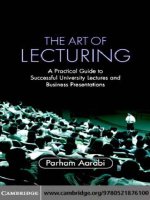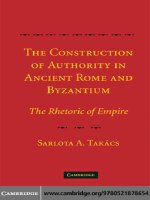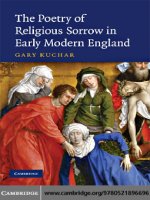0521771374 cambridge university press the spirit of 1914 militarism myth and mobilization in germany may 2000
Bạn đang xem bản rút gọn của tài liệu. Xem và tải ngay bản đầy đủ của tài liệu tại đây (2.25 MB, 285 trang )
This page intentionally left blank
The Spirit of 1914
Militarism, Myth and Mobilization in Germany
This book is the first systematic analysis of German public opinion at
the outbreak of the Great War and the first treatment of the myth of the
“spirit of 1914,” which stated that in August 1914 all Germans felt “war
enthusiasm” and that this enthusiasm constituted a critical moment in
which German society was transformed. Jeffrey Verhey’s powerful study
demonstrates that the myth was historically inaccurate. Although intellectuals and much of the upper class were enthusiastic, the emotions and
opinions of most of the population were far more complex and contradictory. Jeffrey Verhey further examines the development of the myth in
newspapers, politics, and propaganda, and the propagation and appropriation of this myth after the war. His innovative analysis sheds new
light on the German experience of the Great War and on the role of
political myths in modern German political culture.
is a researcher at the Friedrich Ebert Foundation in
Bonn, and has previously taught at the University of California,
Berkeley, the University of California, Davis, and the Free University of
Berlin. He is the author of numerous articles on modern German cultural history, the history of comparative propaganda, and the history of
comparative stereotypes.
Studies in the Social and Cultural History of Modern Warfare
General Editor
Jay Winter Pembroke College, Cambridge
Advisory Editors
Paul Kennedy Yale University
Antoine Prost Université de Paris-Sorbonne
Emmanuel Sivan The Hebrew University of Jerusalem
In recent years the field of modern history has been enriched by the
exploration of two parallel histories. These are the social and cultural
history of armed conflict, and the impact of military events on social and
cultural history.
Studies in the Social and Cultural History of Modern Warfare
presents the fruits of this growing area of research, reflecting both the
colonization of military history by cultural historians and the reciprocal
interest of military historians in social and cultural history, to the benefit
of both. The series offers the latest scholarship in European and nonEuropean events from the 1850s to the present day.
For a list of titles in the series, please see end of book.
The Spirit of 1914
Militarism, Myth, and Mobilization in Germany
Jeffrey Verhey
Friedrich Ebert Foundation, Bonn
The Pitt Building, Trumpington Street, Cambridge, United Kingdom
The Edinburgh Building, Cambridge CB2 2RU, UK
40 West 20th Street, New York, NY 10011-4211, USA
477 Williamstown Road, Port Melbourne, VIC 3207, Australia
Ruiz de Alarcón 13, 28014 Madrid, Spain
Dock House, The Waterfront, Cape Town 8001, South Africa
© Jeffrey Verhey 2004
First published in printed format 2000
ISBN 0-511-03427-X eBook (Adobe Reader)
ISBN 0-521-77137-4 hardback
Betsy
Enthusiasm always does, and always must, defeat him who is not so
enthusiastic. It is not the power of the army nor even of the weapons, it is
the strength of the will alone which achieves victories.
Johann Gottlieb Fichte, Addresses to the
German Nation, Eighth Address (1808)
. . . the people’s war. Any nation that uses it intelligently will, as a rule,
gain some superiority over those who disdain its use. If this is so, the
question only remains whether mankind at large will gain by this further
expansion of this element of war; a question to which the answer should
be the same as to the question of war itself. We shall leave both to the
Carl von Clausewitz, On War, Book 6, chapter 26 (1832)
philosophers.
Contents
List of illustrations
List of tables
Acknowledgements
List of abbreviations
Introduction: The myth of the “spirit of 1914”
1.
Public opinion in Germany, July 1914: the evidence of the
crowds
Newspapers as a source for studying German public opinion in 1914
Mass psychology and the analysis of the crowds of 1914
Curious and enthusiastic crowds in Berlin, 25 July
Crowds in Germany (except Berlin) on Saturday, 25 July
Enthusiastic and curious crowds in Germany, Sunday, 26 July–Thursday,
30 July 1914
Crowds of panic and fear
Crowds against war
2.
The response to the outbreak of the war
The response to the proclamation of the state of siege, 31 July
The response to the proclamation of mobilization, 1 August
3.
The “August experiences”
Curious crowds, audience crowds
“Carnivalesque” crowds
Crowds of panic and depression
“War enthusiasm”: volunteers, departing soldiers, and victory celebrations
4.
The “spirit of 1914” in the immediate interpretations of the
meaning of the war
The “Great Times”: the melodrama of the August experiences
The “ideas” of 1914
Toward a “myth” of the spirit of 1914
page xi
xii
xiii
xiv
1
12
12
22
26
33
38
47
52
58
58
64
72
72
82
89
97
115
117
126
134
ix
x
5.
Contents
The government’s myth of the spirit of 1914
Sustaining the “spirit of 1914” through censorship
The “new orientation”
Propaganda in the service of national unity
6.
The “spirit of 1914” in the discourse of the political parties
The 4 August vote in parliament: the birth of the Burgfrieden
Toward a civil society: liberal attempts to improve the style of political rhetoric
The “politics of 4 August”: Prussian suffrage reform
The conservative image of the “spirit of 1914”
The German Fatherland Party
7.
The myth of the “spirit of 1914” in German propaganda,
1916–1918
The military’s conceptualization of a “total war”
The “spirit of 1914,” 1916–1918
The “spirit of 1914” in the revolution of 1918
8.
The “spirit of 1914,” 1919–1945
Remembering and commemorating the “August experiences” during the
1920s
The Volksgemeinschaft
The stab-in-the back legend (Dolchstosslegende)
The “spirit of 1914” in National Socialism
The end of the myth of the “spirit of 1914”
136
142
146
149
156
157
161
166
173
178
186
187
192
202
206
207
213
219
223
228
Conclusion: the myth of the “spirit of 1914” in German political
culture, 1914–1945
231
Select bibliography
Index
239
262
Illustrations
1. Downtown Berlin in 1914 (Kiesling Verlag, 1919 edition,
page 74
Archiv der sozialen Demokratie, der Friedrich-EbertStiftung, Bonn (AdsD))
2. Troops marching through Düsseldorf in August 1914 on their
80
way to the front (Landesarchiv Düsseldorf)
3. Drawing of troops marching to the front by R. Vogts for the
81
Berliner illustrierte Zeitung, 6 September 1914, p. 651 (AdsD)
4. “Humorous” postcard by Louis Oppenheim from 1914
104
(AdsD)
5. Drawing of troops at a train station by Felix Schwormstädt
196
for the Leipziger Illustrierte Zeitung, 13 August 1914, reprinted
in Paul Schreckenbach (ed.), Der Weltbrand. illustrierte
Geschichte aus großer Zeit mit zusammenhängendem Text
(Leipzig, 1920), vol. I, p. 21 (AdsD)
6. Graphics from the leaflet “To the German People (An das
197
Deutsche Volk),” published by the government in December
1916 (AdsD)
7. “Through Hard Work to Victory. Through Victory to Peace.”
199
Poster by A. M. Cay, published by the government in 1918
(AdsD)
8. “Help us Win. Subscribe to War Loans.” Poster by Fritz Erler 200
for the sixth war-loan campaign in 1917 (AdsD)
9. “The Day-Dreams of a Reservist.” Poster by Ludwig
233
Hohlwein for a film with this title from late 1914 (DHM)
xi
Tables
1. The social background of volunteers in the Leipzig
Artillery Regiment, no. 77
2. The social background of volunteers in the Stuttgart
Tenth Infantry Regiment
3. Newspapers punished from the beginning of the war till
30 March 1916
4. Newspapers punished between 8 March 1916 and
15 May 1918
5. Newspapers punished from the beginning of the war until
15 May 1918 (tables 3 and 4)
xii
page 100
100
145
145
146
Acknowledgements
My research for this book began some years ago at the University of
California, Berkeley. Many people and institutions assisted me in the
course of my research and writing. Research funds were provided by the
Social Science Research Council – Berlin Program for Advanced
European Studies, IREX, the University of California, Berkeley, the
Luftbrückendank fellowship program, the Mainz Institute for European
Studies, and the Friedrich Ebert Foundation. The staff of libraries and
archives throughout Germany and the United States offered kind and
thoughtful guidance. Gerald Feldman offered me his wise advice at all
phases of this project. Susanna Barrows, Bernd Ulrich, Ben Lapp,
Reinhard Rürup, Wolfgang Kruse, Benno Wagner, and Jay Winter read
sections of the manuscript and offered suggestions for improvement. Jay
Winter gave me assistance and advice at a critical moment. My parents,
Carl Verhey and Carol Van Dyke, provided aid and a place to get away
from it all. My wife and my children shared the ups and downs associated
with this project.
xiii
Abbreviations
Abt.
AdsD
ADV
AK
BA
BAL
BA–MA
BdF
BLA
CSU
DDP
DHM
DNVP
DVP
FVV
GhStAPK
HStA
KP
KPD
KrA
KrM
NSDAP
OHL
OK
OZ
RLB
SA
SPD
stellv. GK
USPD
VDA
WUA
xiv
Abteilung
Archiv der sozialen Demokratie der Friedrich-EbertStiftung, Bonn
Alldeutscher Verband
Armeekorps
Bundesarchiv, Koblenz
Bundesarchiv, Lichterfelde
Bundesarchiv–Militärarchiv, Freiburg
Bund deutscher Frauenverein
Brandenburgisches Landeshauptarchiv
Christlich-Soziale Union
Deutsche Demokratische Partei
Deutshes Historisches Museum
Deutschnationale Volkspartei
Deutsche Volkspartei
Freie Vaterländische Vereinigung
Geheimes Staatsarchiv Preussischer Kulturbesitz
Hauptstaatsarchiv
Kriegspresseamt
Kommunistische Partei Deutschlands
Kriegsarchiv
Kriegsministerium
Nationale Sozialistische Deutsche Arbeiter Partei
Oberste Heeresleitung
Oberkommando
Oberzensurstelle
Reichslandbund
Sturm-Abteilung
Sozialdemokratische Partei Deutschlands
Stellvertretendes Generalkommando
Unabhängige Sozialdemokratische Partei Deutschlands
Verein Deutscher Arbeitgeber
Werk des Untersuchungsausschusses
Introduction:
The myth of the “spirit of 1914”
In August 1914 Germany went to war. The war was not unexpected. It
had been brewing for quite a while. Yet when it came it came suddenly
and, like a whirlwind, transformed German public opinion. In the afternoon of 28 June newspaper vendors sold “extras” telling of the murder of
the Austro-Hungarian Crown Prince. For a few days there was excitement in the streets, and small crowds formed around the newspaper
stands. Yet this fever quickly subsided. After the first week of July there
was almost no mention in the press of Austrian–Serbian foreign relations,
or of foreign relations at all. Instead, newspapers contained the sorts of
diversions that made for pleasant reading alongside a glass of beer in the
good summer weather: the trial of Rosa Luxemburg for anti-militaristic
remarks, the scandals in France, and yet another call from the right for
patriotic Germans to join together to fight the peril of Social Democracy.
On 23 July this changed. Newspapers reported that Austria had issued
Serbia an ultimatum, due to expire on Saturday, 25 July at 6.00 p.m.
Readers need not be reminded that as Germany was allied with Austria
this could lead to German involvement in a European conflagration. In
the late afternoon on 25 July vast crowds of curious and excited people
gathered in the larger German cities at the sites where they expected the
news of the Serbian response first to be distributed: at the city squares
downtown, in front of the newspaper office buildings, in the downtown
cafés. After learning that Serbia had rejected the ultimatum, in Berlin and
a few other large cities “parades” of enthusiastic youths marched through
the streets, singing patriotic songs.
The next week Germans wondered if they would be going to war.
Crowds of curious people gathered where the extras would first be distributed, in public squares or in front of the newspaper buildings. As the
week continued the curious crowds grew in size. People waited for hours,
wondering about their fate. The tension was palpable. Finally, on 31 July
the news came: the proclamation of the state of siege. The next day even
more nervous, curious people gathered in public squares and in front of
1
2
Introduction
the newspaper buildings, waiting for the extras which, in the afternoon,
informed them of the mobilization. Germany was at war.
In many places the extras stating that Germany was at war were greeted
with a chorus of patriotic outbursts, people yelling hurrah and singing
patriotic songs, which many contemporaries and most historians have
characterized as “war enthusiasm.” On 1 August 1914 tens of thousands
in front of the Berlin castle broke out in what seemed to many contemporaries to be a “religious” ecstasy when the Kaiser spoke to his people, proclaiming from a castle window that he no longer recognized any parties,
he knew only Germans.
The first month of the war resembled a month-long patriotic festival. In
the first three weeks of August Germans said good-bye to their troops,
smothering them with flowers and so much chocolate that the Red Cross
asked the population to be less generous; the soldiers were getting sick.1
At the end of August Germans celebrated the news of the first successful
battles with exuberance, as if the war had been won. The national flag
flew everywhere, even in the courtyards of Berlin’s working-class apartment houses, where it had never been seen before.
When published in newspapers or shown in movie-house newsreels,
the photographs of the August enthusiasm had an immediate “historic”
aura. In the next few days and weeks journalists, politicians, and government officials contributed to this aura by employing a religious vocabulary to describe what was already known as the “August experiences.”
The “war enthusiasm” was a “holy” moment,2 a “holy flame of anger,”3
“heroic,”4 a “revelation,”5 it had brought forth a “rebirth through war,”6
had brought Germans “out of the misery of everyday life to new
heights.”7 “What Germany has experienced in these days was a miracle, a
renewal of oneself; it was a shaking off of everything small and foreign; it
was a most powerful recognition of one’s own nature,” wrote a Tägliche
Rundschau journalist.8 “Whatever the future may have in store for us,”
Chancellor Bethmann Hollweg stated at the close of the 4 August session
11
12
13
14
15
16
17
18
See the letter from Prof. Dr. Messerer, 4 September 1914, Staatsarchiv München,
Polizeidirektion, no. 4556.
Gottfried Traub, “Heilige Gegenwart,” Illustrierte Zeitung (Leipzig), no. 3713, 27 August
1914, p. 344.
“Eine erhebende Kundgebung des geistigen Berlins,” Berliner Morgenpost, 4 August
1914, no. 211, p. 3.
“Der Siegessonntag,” Tägliche Rundschau, 24 August 1914, no. 398 (Sonder-Ausgabe),
p. 4.
“In der Reichshauptstadt,” Norddeutsche Allgemeine Zeitung, 6 August 1914, no. 182, p. 1.
Oscar Schmitz, “Die Wiedergeburt durch den Krieg,” Der Tag, 9 August 1914, no. 185.
Quoted in Wilhelm Pressel, Die Kriegspredigt 1914–1918 in der evangelischen Kirche
Deutschlands (Göttingen, 1967), p. 14.
H. R., “Mobilisierung in Deutschland und in Frankreich,” Tägliche Rundschau, 2 August
1914, no. 358 (Morgen), p. 1.
The myth of the “spirit of 1914”
3
of parliament, “the fourth of August 1914 will, for all time, remain one of
Germany’s greatest days.”9 “One will speak and talk of this first week of
August as long as the German people exist and the German language
sounds. Whoever was able to experience it, he will be accompanied by its
pictures and its emotions as long as he lives,” wrote a Tägliche Rundschau
journalist on 9 August.
As time passed the “spirit of 1914” would be invoked as an experience
and a goal, as a holy memory and a utopian future. The “spirit of 1914,”
wrote the Berlin historian Friedrich Meinecke in late 1914, must be the
“victory prize.”10 Future generations, wrote the journalist Ferdinand
Avenarius in October 1914, would judge their present by how much of
the “spirit of 1914” remained.11 On 1 August 1915 the theologian
Gottfried Traub claimed that “the August days . . . will remain a source of
future strength, destroying all doubters.”12 The young author Walter Flex
professed in 1916:
It is my belief that the German spirit in August 1914 and after achieved heights
such as no people before or after has seen. Happy is he who has stood at this peak
and did not have to climb down. The following generations of Germans and other
nations will look at this, God’s water mark, as the edge of the border from which
they walk forward.13
After the war the memory of 1914 would be invoked as an ideal and a
goal. Gustav Stresemann claimed at the 1921 conference of the Liberal
German People’s Party that “never did a people stand purer before God
and history than the German people in 1914.” If we have “not been able
to find our way back to the unity of 1914,” continued Stresemann, “it
must remain our goal.”14 The Münchner Neueste Nachrichten wrote on the
ten-year anniversary of the beginning of the war, one year after the Ruhr
crisis, that we must look back to the “spirit of 1914” to “awaken the belief
in the future of our own people.”15 Gertrud Baümer, one of Germany’s
leading female politicians and journalists, wrote in her memoirs, pub19
10
11
12
13
14
15
Bethmann Hollweg’s speech is reprinted in Ralph Lutz (ed.), Fall of the German Empire
1914–1918. Documents of the German Revolution, vol. I (Stanford, 1932), p. 16.
Friedrich Meinecke, “Um welche Güter kämpfen wir (19 August 1914),” pp. 50–51; and
“Staatsgedanke und Nationalismus (October 1914),” p. 76, both in Friedrich Meinecke,
Die deutsche Erhebung von 1914. Vorträge und Aufsätze (Stuttgart and Berlin, 1914).
Similarly, the Berlin law professor, Wilhlem Kahl, in “Dr. Kahls Rede in schwerer Zeit,”
Deutsche Tageszeitung, 10 October 1914, BAL, RLB Pressearchiv, no. 7565, p. 8.
Ferdinand Avenarius, “Die neue Zeit,” Der Kunstwart 28, no. 1 (October, 1914), p. 4.
Gottfried Traub, “Deutschlands Schwerttag,” Eiserne Blätter, 1 August 1915, BA, Abt.
Koblenz, NL Traub, no. 7, no p.
Walter Flex, quoted in Benno Schneider and Ulrich Haacke (eds.), Das Buch vom Kriege,
1914–1918. Urkunden, Berichte, Briefe, Erinnerungen (Ebenhausen, 1933) p. 37.
Quoted in Nationalliberale Correspondenz, 1 December 1921, BAL, 62 DAF 3, no. 697,
p. 176.
“Den Kriegsopfern,” Münchner Neueste Nachrichten, 3 August 1924, no. 209, p. 5.
4
Introduction
lished in 1933, that “come what may . . . the memory of that Sunday [1
August] will remain and will continue to be a value in itself.”16 In 1933
the National Socialists claimed that the origins of the present “revolution” lay in the “spirit of 1914.” They described their accession to power
as a recreation of the days of 1914. On 21 March 1933, the “Day at
Potsdam” when Hitler and Hindenburg shook hands, the minister at the
official church service, Dr. Dibelius, interpreted this symbolic handshake
as the renewal of the “spirit of 1914,” thus demonstrating that others saw
it that way, too.17
What engendered such rhetoric? Certainly the August “experiences”
were powerful. In August 1914 one had to be peculiarly dull not to feel
the emotions C. E. Montague has so poignantly described (in a different
context):
the evening before a great battle must always make fires leap up in the mind . . .
For there the wits and the heart may be really astir and at gaze, and the common
man may have, for the hour, the artist’s vision of life as an adventure and challenge, lovely, harsh, fleeting, and strange. The great throw, the new age’s impending nativity, Fate with her fingers approaching the veil, about to lift – a sense of
these things is a drug as strong as strychnine to quicken the failing pulse of the
most heart-weary of moribund raptures.18
Yet some contemporaries not only asserted that these experiences were
exciting, they interpreted them as a liminal moment, what Paul Tillich (in
a different context) has termed a Kairos: “an outstanding moment in the
temporal process, a moment in which the eternal breaks into the temporal
– shaking and transforming it, creating a crisis in the depth of human existence.”19 In this “internal transformation,”20 this purification of the soul,
this “rebirth through war,”21 when individual and collective identities
were transformed, Germans felt the ecstasy that accompanies the belief
that eternal truths and reality have become one. In the words of Rudolf
Eucken, a philosophy professor and a Nobel laureate in literature:
an exultation took place, a transformation of an ethical nature. We felt ourselves
placed completely in the service of a higher task, a task which we ourselves had
16
17
18
19
20
21
Gertrud Bäumer, Lebensweg durch eine Zeitwende (Tübingen, 1933), pp. 264–265.
Thus, as on 4 August 1914, the text for the sermon was Romans 8, verse 31: “If God is for
us, who can be against us.”
C. E. Montague, Disenchantment (Westport, 1978, first published 1922), p. 122.
Paul Tillich, The Protestant Era (Chicago, 1949), p. 45, and “Kairos. Ideen zur
Geisteslage der Gegenwart,” in Paul Tillich (ed.), Kairos. Zur Geisteslage und
Geisteswendung (Darmstadt, 1926), pp. 1–21.
Karl Mayr, “Wilhelm II,” Süddeutsche Monatshefte 11 (September 1914), p. 790.
Oscar Schmitz, Das wirkliche Deutschland. Die Wiedergeburt durch den Krieg (Munich,
1915), pp. 4 ff.; Schmitz, “Die Wiedergeburt durch den Krieg,” Der Tag, 9 August 1914,
no. 185.
The myth of the “spirit of 1914”
5
not sought, but which had been placed upon us by a higher power, and which had
therefore the compelling power of an imperative duty . . . We experienced a powerful upswing in our souls: the life of the whole became directly the life of each individual, everything stale was swept away, new fountains of life opened themselves
up. We felt ourselves taken above ourselves, and we were full of burning desire to
turn this new consciousness into action.22
The enthusiasm made Germans more religious, more courageous, more
masculine, more authentic, brought the end of the “the superficiality of
the soul and the mind, the drive for fun and pleasure.”23
Above all, the “August experiences” were an experience of fraternity, of
community, and a catalyst that would create what would later be termed
the Volksgemeinschaft. In the words of the sociologist Emil Lederer,
writing in 1915, “during the days of mobilization the society (Gesellschaft)
which had existed transformed itself into a community (Gemeinschaft).”24
It was here, in describing the nature of their experience of community,
that contemporaries found their most colorful, their most inspired language. The conservative minister Eduard Schwartz professed:
The Volk has risen up as the only thing which has value and which will last. Over
all individual fates stands that which we feel as the highest reality: the experience
of belonging together.25
The theologian Ernst Troeltsch asserted:
Under this incredible pressure German life melted in that indescribable wonderful unity of sacrifice, brotherhood, belief, and certainty of victory which was, and
is, the meaning of the unforgettable August.26
According to the liberal journalist Hellmut von Gerlach, “prejudices have
fallen, false opinions have been corrected, people, divided before by enormous mountains, have come to see one another as comrades
(Volksgenossen).”27 The liberal journalist and feminist Gertrud Bäumer
claimed that in August 1914 “the limitations of our egos broke down, our
blood flowed to the blood of the other, we felt ourselves one body in a
mystical unification.”28
22
23
24
25
26
27
28
Rudolf Eucken, “Der Sturm bricht los!,” Deutsche Kriegswochenschau, 29 July 1917, no.
34, p. 1.
Otto von Pfister, Neues deutsches Leben und Streben, second edition (Berlin, 1915), p. 5.
Emil Lederer, “Zur Soziologie des Weltkrieges,” in Kapitalismus, Klassenstruktur und
Probleme der Demokratie in Deutschland 1910–1940 (Göttingen, 1979), pp. 120–121. The
essay is from 1915.
Eduard Schwartz, Der Krieg als nationales Erlebnis. Rede gehalten im Saal der Aubette zu
Straßburg am 24. Oktober 1914 (Strasburg, 1914), pp. 2–3.
Ernst Troeltsch, Der Kulturkrieg (Berlin, 1915), pp. 25–26.
Hellmut von Gerlach, “Das Jahr des Umsturzes,” Die Welt am Montag 20, no. 52
(28 December 1914), pp. 1–2.
Gertrud Bäumer, “Frauenleben und Frauenarbeit,” in Max Schwarte (ed.), Der Weltkrieg
in seiner Einwirkung auf das deutsche Volk (Leipzig, 1918), p. 314.
6
Introduction
Did this account of the “August experiences” accurately describe the
emotions and feelings of the German people in 1914? Curiously, only
recently have historians turned their attention to this question. Although
there is an enormous literature on the outbreak of the First World War, on
“war guilt,” on the actions, intentions, and motivations of government
officials, until recently most historians simply accepted contemporaries’
accounts of German public opinion in 1914 as “enthusiastic” without
systematically analyzing or investigating it.29 George Mosse has typically
written that the outbreak of war was met with “indescribable enthusiasm.”
Modris Eksteins saw the August experiences as a German “Frühlingsfeier,
her rite of spring.” Eric J. Leed claimed that “August 1914 was the last
great national incarnation of the ‘people’ as a unified moral entity.”30
Historians engaged in local histories on First World War Germany have
suggested, however, that the mood of the population in July and August
1914 cannot be adequately explained by the adjective “enthusiastic.”
Klaus Schwarz noted in his 1971 history of Nuremberg in the First World
War that “the population of Nuremberg reacted to the increasing possibility of war in a much more nuanced manner than is expressed by the
cliché of broad war enthusiasm.”31 Volker Ullrich came to similar conclusions in his 1976 study of Hamburg,32 Friedhelm Boll in his 1981 study
of Braunschweig and Hanover,33 Michael Stöcker in his 1994 study of
Darmstadt,34 Wolfgang Kruse in his 1994 study of the German working
class and the Sozialdemokratische Partei Deutschlands (SPD) in 1914,35
Benjamin Ziemann in his 1997 study of the wartime experience in rural
29
30
31
32
33
34
35
See Wolfgang Jäger, Historische Forschung und politische Kultur in Deutschland. Die Debatte
1914–1980 über den Ausbruch des Ersten Weltkrieges (Göttingen, 1984). Nor was this tendency limited to academic literature. In two popular books on the outbreak of the First
World War there was also little discussion of the “spirit of 1914”: Eugen Fischer, Die kritischen 39 Tage. Von Sarajewo bis zum Weltbrand (Berlin, 1928); and Emil Ludwig, Juli 14.
Vorabend zweier Weltkriege (Hamburg, 1961 [first published in 1929]).
George Mosse, Fallen Soldiers: Reshaping the Memory of the World Wars (New York, 1990),
p. 70; Modris Eksteins, The Rites of Spring. The Great War and the Birth of the Modern Era
(Boston, 1989), p. 94; Eric J. Leed, No Man’s Land. Combat and Identity in First World War
(Cambridge, 1979), p. 30. The most recent example in this vein is Peter Fritzsche,
Germans into Nazis (Cambridge, 1998).
Klaus Dietrich Schwarz in his Weltkrieg und Revolution in Nürnberg. Ein Beitrag zur
Geschichte der deutschen Arbeiterbewegung (Stuttgart, 1971), p. 106.
Volker Ullrich, Die Hamburger Arbeiterbewegung vom Vorabend des Ersten Weltkrieges bis zur
Revolution 1918/1919 (Hamburg, 1976), p. 11; and Kriegsalltag. Hamburg im Ersten
Weltkrieg (Cologne, 1982).
Friedhelm Boll, Massenbewegungen in Niedersachsen 1906–1920. Eine sozialgeschichtliche
Untersuchungen zu den unterschiedlichen Entwicklungstypen Braunschweig und Hannover
(Bonn, 1981), p. 151.
Michael Stöcker, Augusterlebnis 1914 in Darmstadt. Legende und Wirklichkeit (Darmstadt,
1994).
Wolfgang Kruse, Krieg und nationale Integration: eine Neuinterpretation des sozialdemokratischen Burgfriedensschlusses 1914/1915 (Essen, 1993).
The myth of the “spirit of 1914”
7
Bavaria,36 and Christian Geinitz in his 1998 study of Freiburg.37
Although these works have gone a long way toward reforming the traditional view of the history of the August experiences, we still lack a study of
German public opinion in July and August 1914 as a whole.38 What were
the German people feeling and thinking in those warm days in July and
August 1914? How broad was the “war enthusiasm?” What were the geographical, occupational, and temporal variations in the way Germans
greeted the outbreak of the war? What emotions are described by “war
enthusiasm?” And what were the other emotions people felt in these
exciting and confusing days? The first part of this book (chapters 1–3)
attempts to answer these questions.
The second part (chapters 4–8) concentrates on the creation, genealogy,
and reception of a narrative of the meaning of the August experiences, a
narrative that contemporaries termed the “spirit of 1914.” This narrative
was one of the most important narratives of the war. On 31 July 1916
Theodor Wolff, the editor of the Berliner Tageblatt, wrote:
Two years ago today the state of siege was declared . . . We know how false it is
when Temps and similar newspapers reassure their readers that the German
people greeted the outbreak of war with joy. Our people had heavy hearts; the possibility of war was a frightening giant nightmare which caused us many sleepless
nights. The determination with which we went to war sprang not from joy, but
from duty. Only a few talked of a “fresh, wonderful war.” Only a very few, too, in
comparison to the great masses, found flags immediately after the Austrian ultimatum and marched in front of the windows of the allied embassies, including the
Italian, and in front of the Chancellor’s office, screaming themselves hoarse.39
36
37
38
39
Benjamin Ziemann, Front und Heimat. Ländliche Kriegserfahrungen im südlichen Bayern
1914–1923 (Essen, 1997), pp. 39–54. Other local studies, such as Karl-Dietrich Ay, Die
Entstehung einer Revolution. Die Volksstimmung in Bayern während des Ersten Weltkrieges
(Berlin, 1968), Eberhard Lucas, Die Sozialdemokratie in Bremen während des ersten
Weltkrieges (Bremen, 1969), Gunter Bers (ed.), Die Kölner Sozialdemokratie und der
Kriegsausbruch (Hamburg, 1974), and Detlef Josczak, Die Entwicklung der sozialistischen
Arbeiterbewegung in Düsseldorf (Hamburg, 1980), do not investigate war enthusiasm in
1914. For a brief account of the mood among the working classes in the Ruhr, see Jürgen
Reulecke, “Der Erste Weltkrieg und die Arbeiterbewegung im rheinisch-westfälischen
Industriegebiet,” in Arbeiterbewegung an Rhein und Ruhr. Beiträge zur Geschichte der
Arbeiterbewegung in Rheinland-Westfalen (Wuppertal, 1974), pp. 205–239, especially
pp. 210 ff.
Christian Geinitz, Kriegsfurcht und Kampfbereitschaft. Das Augusterlebnis in Freiburg. Eine
Studie zum Kriegsbeginn 1914 (Essen, 1998). This work appeared after I had completed
this book.
Thomas Reithel’s Das “Wunder” der inneren Einheit. Studien zur deutschen und französischen Öffentlichkeit bei Beginn des Ersten Weltkrieges (Bonn, 1996) by concentrating almost
exclusively on newspapers, is unable to go beyond impressionistic accounts of the
German public realm at the beginning of the war.
T. W., untitled, Berliner Tageblatt, 31 July 1916, no. 387, p. 1, reprinted in Theodor Wolff,
Vollendete Tatsachen 1914–1917 (Berlin, 1918), p. 119.
8
Introduction
Upon reading this, the Berlin censor, the Oberkommando in den
Marken, General von Kessel, forbade indefinitely the newspaper’s further
publication. Kessel was upset, he wrote to Wolff, because “the many
thousands who two years ago gave joyful expression to their patriotic feelings are described as an insignificant lump of hoarse screamers.”40
Although the Berliner Tageblatt, one of Germany’s most respected newspapers, had many difficulties with censors during the war, this was its
most serious crisis. Only Wolff’s promise that he would not write any
more articles during the war convinced Kessel to allow the Berliner
Tageblatt to resume publication. (The prohibition against Wolff was lifted
in November 1916.)
Why was a certain memory of the August experiences so important to
Kessel? Certainly Kessel was not angry because he believed Wolff’s
version to be historically inaccurate. Rather, aware (whether consciously
or unconsciously) that modern political power cannot be sustained
through physical coercion but only through consensus, Kessel and compatriots aimed to turn a certain narrative of the history of the “spirit of
1914” into a social myth, that is, an important, unquestioned historical
narrative. Kessel hoped to inscribe in the myth of the “spirit of 1914” the
conservative norms and values, and to make this narrative the representation of the “common sense” of the German political culture, “the values,
expectations, and implicit rules that expressed and shaped collective
intentions and actions.”41 The conservative history of the “spirit of 1914”
claimed that all Germans had felt that peculiar emotion known to contemporaries as “war enthusiasm,” that in this moment of enthusiasm they
had become not only aware of their common national identity – the ideas
a community shares as beliefs – but that the best description of that identity, of what was German, was found in the conservative ideology. This
conservative history of the “spirit of 1914” was thus a narrative of a past
40
41
Kessel’s 1 August 1916 letter, as well as the correspondence which followed, is in BAL,
Reichsamt des Innern, no. 12276, pp. 247 ff., and in BAL, Reichskanzlei, no. 1392, p. 24.
Theodor Wolff’s reflections on the affair can be found in his diary, Tagebücher 1914–1918,
vol. II (Boppard am Rhein, 1984), pp. 406 ff.
This is Lynn Hunt’s definition of “political culture” in her Politics, Culture, and Class in the
French Revolution (Berkeley, 1984), p. 10. I have discussed aspects of my understanding of
the mythical nature of the narrative of the “spirit of 1914” in “Der Mythos des ‘Geistes
von 1914’ in der Weimarer Republik,” in Wolfgang Bialas and Bernhard Stenzel (eds.),
Die Weimarer Republik zwischen Metropole und Provinz. Intellektuellendiskurse zur politischen
Kultur (Weimar, 1996), pp. 85–96. My understanding of political myth owes much to
William McNeil, “The Care and Repair of Public Myth,” in Mythistory and other Essays
(Chicago, 1986), pp. 23 ff.; Walter Lippmann, Public Opinion (New York, 1922); Leszek
Kolakowski, The Presence of Myth (Chicago, 1989); Ernst Cassirer, The Myth of the State
(New Haven, 1946); and Manfred Frank, Der kommende Gott. Vorlesungen über die Neue
Mythologie (Frankfurt/Main, 1982). My understanding of collective, or social memory
has benefited especially from James Fentress and Chris Wickham, Social Memory
(Oxford, 1992).
The myth of the “spirit of 1914”
9
event, but with a purpose distinctly in the present. Indeed, given the
myth-makers’ intentions, it is not surprising that their myth of the “spirit
of 1914,” an account of the history of German public opinion in July and
August 1914, became increasingly more removed from its real history. As
Northrop Frye has noted: “a myth, in nearly all its senses, is a narrative
that suggests two inconsistent responses: first, ‘this is what is said to have
happened,’ and second, ‘this almost certainly is not what happened, at
least in precisely the way described.’”42
Political myths are an essential part of modern political culture. They
constitute that web of shared meaning by which the members of a
complex society form and sustain their association. A political myth, as a
representation of the nation, allows a complex social system to perceive
itself as a unit, as an entity and to perceive this “unity” as something
natural, self-evident. In other words, a political myth is both an explanation of social reality, and a constituent element of that reality, a stabilizing
social influence.43 That in the First World War conservative elites
attempted to employ the narrative of the “spirit of 1914” as the most
poignant representation of the German collective identity points not only
to the power of this narrative, but also to a latent crisis of conservative
legitimacy;44 for this particular construction of collective memory represented a break with the collective memories that had governed Germany
in the past.
Before 1914 German political culture was not national, but divided
into partial political cultures. In spite of the efforts of government elites in
socializing institutions such as the schools and the military, there were no
unquestioned national “myths,” rather, Social Democrats worked hard to
expose the conservative narratives as ideology, as the expression of class
interests. The ideological differences in Wilhelmine Germany were profound: if what contemporaries termed the bourgeois ideology was, in its
own words, “staatserhaltend,” that is, upholding the state, the workingclass ideology was “revolutionary.” The right tried to unite the bourgeois
parties against the red menace to culture and decency
(Sammlungspolitik). The left accused the right of immorality – Socialist
newspapers published all the tawdry scandals of Wilhelmine society,
exposing the moral injustices of a class society.45 The ideological and class
divisions were even reflected in the existence of at least two of almost
42
43
44
45
Northrop Frye, “The Koine of Myth: Myth as a Universally Intelligible Language,” in
Myth and Metaphor. Selected Essays 1974–1988 (Charlottesville, 1990), p. 4.
Murray Edelman, The Symbolic Uses of Politics (Urbane, 1967), p. 159.
Andreas Dörner, Politischer Mythos und symbolische Politik (Opladen, 1995).
Vernon L. Lidtke, The Alternative Culture. Socialist Labor in Imperial Germany (New York,
1985). On the concept of partial political cultures, see Detlef Lehnert and Klaus Megerle
(eds.), Politische Identität und Nationale Gedenktage. Zur politischen Kultur in der Weimarer
Republik (Opladen, 1989).









